Musician: PETER MULVEY
Video: “Don’t You Ever Change”
PETER MULVEY FEATURED AT BLUE ROCK’S COOL NIGHTS 21 THIS THURSDAY, DECEMBER 2
Peter Mulvey will be featured at Blue Rock aLive! Cool Nights 21 livestreaming concert series—this Thursday, December 2.
Mulvey’s new album Love is the Only Thing will be released in early 2022 on Ani DiFranco’s Righteous Babe Records. Our featured video is from his most recent release is Live at the Café Carpe—Peter Mulvey & SistaStrings.
Mulvey is a songwriter and raconteur. He took a semester in Ireland and immediately cut classes to busk on Grafton Street in Dublin and hitchhike across the country, finding whatever gigs he could. Back stateside, he spent a couple of years gigging in the Midwest before lighting out for Boston, where he returned to busking—this time in the subway and coffeehouses—and then touring nationally. 19 records, an illustrated book, a TEDx talk, a decades-long association with the National Youth Science Camp, appearances on NPR and an annual autumn bicycle tour. He folds everything he encounters into his work: poetry, social justice, scientific literacy and a deeply abiding humanism.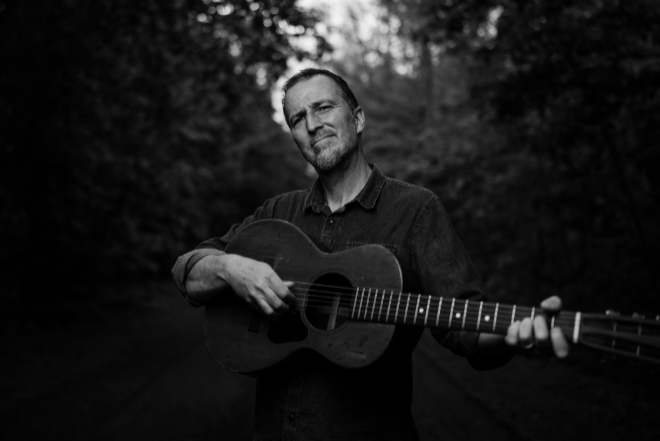
Peter Mulvey’s songs are a direct expression of the man he has become and his love for, and understanding of, the power of words. Through everyday imagery, he brilliantly combines life experiences and the genuine good from spirituality and mixes it to create concise truth that offers a practical guide to living life while respecting others.
Check out his livestream this Thursday, December 2, at Blue Rock Texas—where innovation, quality and creativity are evidenced in concerts produced with broadcast quality audio-video from their renowned Texas room—streamed straight to you. Tickets are $25. Inquire about a Season Pass ($105) which lets you can have a seat in the house—by sending in your headshot. What’s unique is they will place your headshot on a seat, so you will literally be sitting in the room. Go to: https://bluerocktexas.com/events
PETER MULVEY Interview
with M Music & Musicians magazine publisher, Merlin David
Tell us how the upcoming album Love is the Only Thing evolved.
This album was delayed—and delayed again. It’ll be on Righteous Babe Records in early 2022. I wrote three pandemic songs. “Five Hundred Days” is a hopeful little song about starting a family. It goes out to all the people who took that brave step during these uncertain times. It’s the first song I co-wrote with my wife, J. Green. She’s one of those people—she’s made exactly one marble sculpture in her whole life, of her aunt, and it’s genuinely great—like, you should pursue this! We sat down and tried to finish each other’s sentences. It’s written to a future child—a song of anyone hoping to become a parent.
It sounds like an important song in this collection.
The whole record hinges on that song. What all of us have been through over the last five years—with this lurch towards autocracy and authoritarianism happening globally and with our democracy; and then the civilization-deranging pandemic. If we’re going to make things right, it’s just going to be us—our people and our basic family unit—chosen family or biological family. It will be our groups of friends and family—that’s all we actually have. It makes me look at The Lord of the Rings in a whole new light. (Laughs)
Peter Mulvey’s songs are a direct expression of the man he has become and his love for, and understanding of, the power of words. Through everyday imagery, he brilliantly combines life experiences and the genuine good from spirituality and mixes it to create concise truth that offers a practical guide to living life while respecting others.
What did you learn about yourself after recording this album?
I cemented my understanding of myself as America’s middle child. A long time ago, I wrote “Song for Michael Brown,” which is finally going to come out on this record. When I put the song online, this guy said, ‘He was a predator and a thug who would have taken your guitar and sold it for crack.’ I felt the need to engage with this guy: ‘So, let’s just start with a general question, sir. If someone does commit a crime, does that mean they deserve no compassion and there’s no chance of rehabilitation.’ I didn’t get anywhere with that guy—he’d already made up his mind. But I’m that guy who wants to apply what I’ve learned. I used to be an impatient driver. Finally, I freed myself of that contortion of anger and irritation. I try to apply that when I’m on the internet.
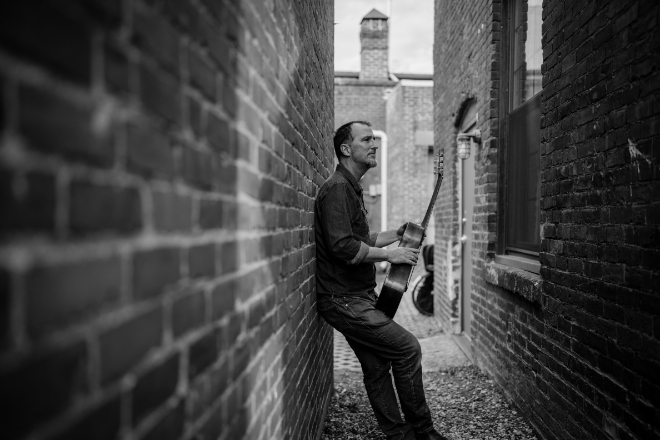
Please tell us the story behind one of the songs you plan to play at Blue Rock’s Cool Nights 21 (for your Dec 2 performance).
“The Garden”—I lead an online songwriting group through my web page. I provide a weekly prompt and then we all write a song based on that and give each other feedback. The week I wrote this song, the prompt was to steal someone else’s title and write a new song to it. So I stole “What the Garden Looked Like”—a song title from someone in the songwriting group. We probably have a thousand song titles. I picked up a two-string diddley bow made out of a stick and a cardboard box and some zip ties, and just made it up in ten minutes. Except, of course, that the contents of the song (Dear Abby, Trungpa Rinpoche, Muhammad Ali and the famous “I don’t eat negroes” incident and James Baldwin’s towering quote) all had to rattle around in my head for fifty years. The best songs are like that—they take ten minutes plus fifty years.
Tell us about that James Baldwin quote.
Baldwin said, “Perhaps everybody has a Garden of Eden, I don’t know; but they have scarcely seen their garden before they see the flaming sword.”
That Muhammad Ali story really had a big impact on you.
“Muhammad Ali said, ‘After winning the Olympic gold medal for boxing, I went downtown that day—had my big old medal on and went to a restaurant. At that time, things weren’t integrated—Black folks couldn’t eat downtown. I sat down and said, ‘A cup of coffee, and ….’ The lady said, ‘We don’t serve negroes.’ I was so mad, I said, ‘I don’t eat them either. Just give me a cup of coffee and a hamburger.’ That was in my own hometown of Louisville, Kentucky—and after I fought for my country in the Rome Olympics! I left that diner, walked across the bridge and threw my gold medal into the Ohio River.” You just don’t undo this kind of stuff in 60 years. We have a lot of work to do in this country.
It’s good that musicians like you are talking about certain realities about America.
Yes! When our refrigerator broke the day we brought our rescue dog home, my wife and I went to get some coolers to put some stuff we had in the refrigerator—and we realized that we had locked ourselves out of our house. So, we climbed in through a window—and nobody shot us. No one called the police on us—a white couple climbing through a window is not as alarming to people. It’s terrible. America has some work to do!
Who originally inspired you to write songs?
Probably Greg Brown and Leo Kottke are my two earliest songwriting inspirations.
What songwriting tip would you like to offer?
I’ll go with Tchaikovsky: “I sit down to the piano regularly at nine-o’clock in the morning and Mesdames les Muses have learned to be on time for that rendezvous.”
Tell us about one of your songs that you almost always play in live performances.
“What Else Was It?” from the 2014 Silver Ladder album, produced by Chuck Prophet. It’s one of those songs that asks questions we don’t ever get to answer and people see themselves in it. That makes me feel so satisfied.
Tell us how the idea of “Take Down Your Flag” came to you?
The song came to me for a very specific reason: I couldn’t stand the whole Charleston Nine Massacre. I especially couldn’t stand the thought of someone shooting an 87-year-old woman, Susie Jackson. Just how spectacularly hateful that is—it beggars the imagination. The song clearly rang a bell with a lot of people. I thought we’d have some sort of awakening after that, but there’s so much more to it.
Have you written eight other verses?
I’ve written several verses to that song. But mostly what I do now is sing other people’s verses. A lot of them really struck me. On any given night, I’ll sing that song one of about six or eight ways. There’s a Boston songwriter, Tim Gearan, who wrote this incredible couplet: “Sister Ethel Lance, there’s a lowcountry clap where you are sleeping; Sister Ethel Lance, today Emanuel could use some sweepin’.” She used to clean up in that church. That was so powerful. Tim was stationed in the Navy in South Carolina, so he knew what a lowcountry clap was—which is a musical form down there. That couplet just blew the doors open.
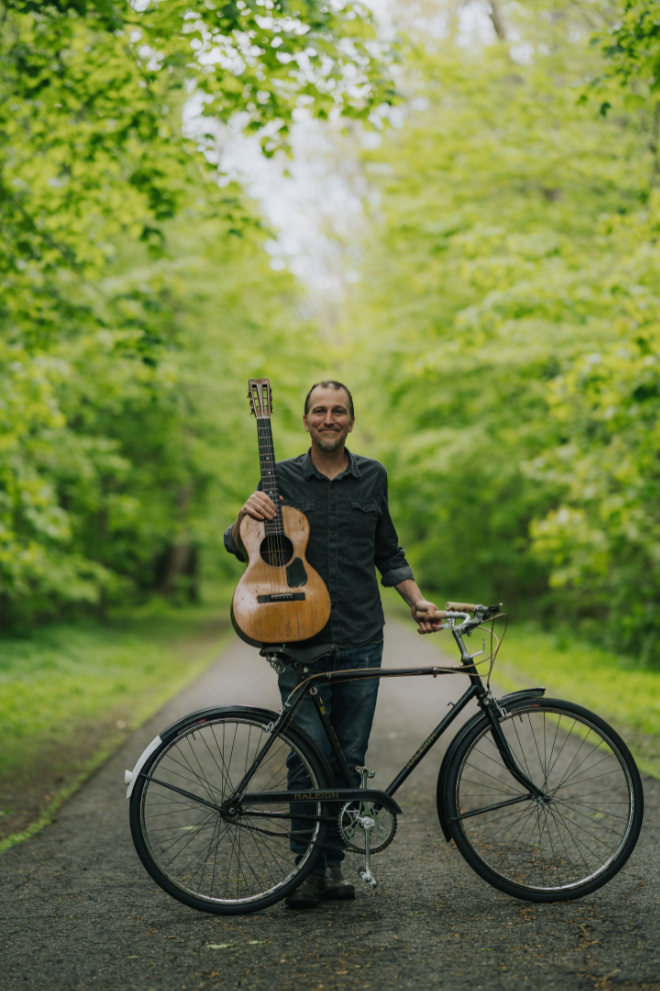
Many musicians have covered this amazing anthem. Why do you feel this song is still important?
The Confederate Battle Flag was just flown inside the U.S. Capitol by supporters of Donald Tr*mp, who is autocratic, racist, anti-democratic, a liar and a danger to our future. The specific evil of the Confederacy, the assumption that some people are meant to rule over others, is wide awake and snarling through our country. So I imagine I’ll be singing that song until I’m done singing.
What instruments/equipment can you not live without?
I’m not married to anything in particular. I like pens better than pencils. I like small parlor-type guitars better than dreadnoughts. They’re all tools. I tend to like plain guitars—and old guitars. I like the sound of my Fishman Rare Earth Blend (a magnetic pickup and a microphone). I like low end, so I typically use an EQ pedal and have become a soundman whisperer. I dream of traveling like Leon Redbone used to—his people would telegram ahead “Bring Mr. Redbone a guitar.” The venue would have to telegram back “What kind of guitar?” The reply was “Mr. Redbone does not care.” He’d show up and play it. That’s the life!
Which Top 5 Musicians inspired you to become a musician?
David Hidalgo, Louie Pérez, Leo Kottke, Greg Brown, David “Goody” Goodrich.
What are your Top 5 favorite albums of all time?
Kiko (1992) — Los Lobos
Rain Dogs (1985) — Tom Waits
The Poet Game (1994) — Greg Brown
Wrecking Ball (1995) — Emmylou Harris
Steal Away (1995) — Charlie Haden & Hank Jones
Tell us a “pinch me” moment when you thought “Wow, this is really happening to me!”
I’ve had hundreds of those moments. It’s not so much with whom, but when the music is really, really happening. I never have a set list. I always just go off the top of my head. It’s more fun that way.
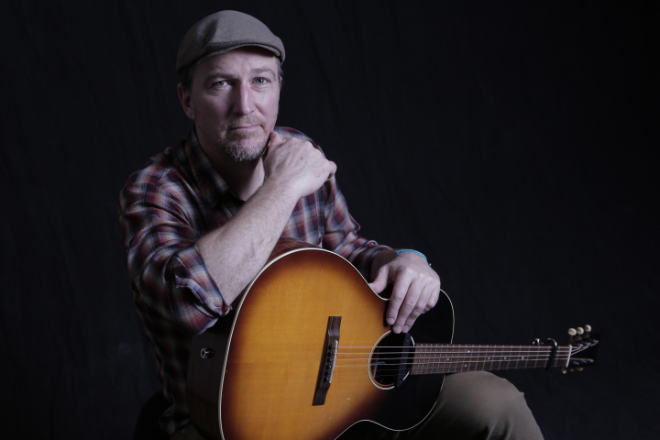
Tell us why playing at Blue Rock is so unique.
I’ve been on the road for 30 years and I’ve only encountered about 6 or 8 places that are super special—listening rooms. There was Arnold Greenberg’s place in Maine called the Left Bank Café, when I first started out on the road—and it’s gone now. There’s a place in Wisconsin called the Café Carpe. What it amounts to is—it’s really Billy and Dodee. They are so dedicated to it. Blue Rock is essentially them and their love of it. It’s my third time there. I’m really looking forward to the gig, a lot, but I’m really looking forward to the songwriting workshop the next day—where I have the chance to hang with hopefully 10 people and really dive into their music.
How do you remain hopeful in this strange and unique socio-political time?
I’m just going to have to go with Dr. King’s Arc of the Moral Universe. But these days, one can be forgiven for asking “Seriously, how f-ing long is this arc anyway?”
Do you think it’s important for musicians to write songs that move people into action?
I do believe art is meant to hold a mirror up to life, but there are all kinds of ways to do it. Beyonce is extremely political, but she doesn’t need to do it overtly. She is powerful, self-possessed, unapologetic and beautiful—and establishes thorough ownership over her presence, body and self. That’s enough! And then you look at someone like Ani DiFranco, she’s much more in the Woody Guthrie, Tom Paxton model. And I admire the hell out of that. I’ve written a few of those songs, but I tend to write them by accident. I’m just trying to catch a moment. Occasionally, by default, I’ve become political. I just try to be poetic—try to say something relatively true and relatively concise. I love language. Just the idea of trying to say something true—is itself fairly revolutionary.
How did the idea of “Shirt” come to you?
That came from burning a whole bunch of notebooks and letters—which is what I do every six or 10 years. I got the lyric going and realized what I was talking about was age. In your early 30s, when you realize, “OK then, I guess I’m me now. I kind of expected to have more sh*t figured out. But, alright—I guess this will be me!” I can see the people in the audience who are in their early 30s—I can see it ring their bell. “Oh wow, I’m old enough to have an identity and I don’t know what’s going on.” (Laughs)
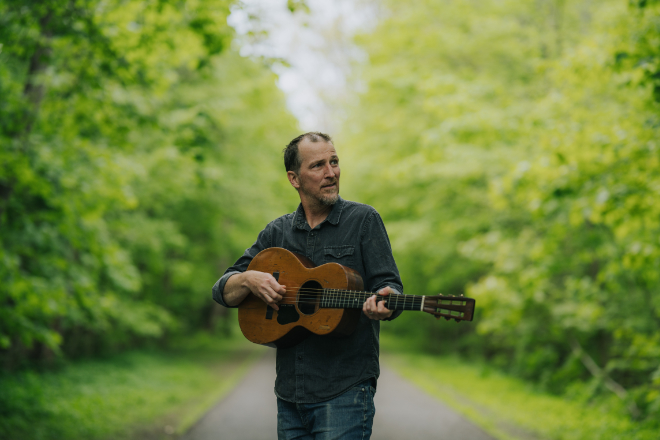
Do you really burn your old notebooks?
I don’t burn everything. I separate them. I’ll take the binder rings off my notebook and put them into two piles. There’s the pile of stuff I want to remember—births, deaths and all that; and then there’s the drivel of my own complaining and all that—and that I throw away. Most of my notebooks are not particularly memorable. I used to be scraps of lyrics but I don’t anymore. I make so much stuff up that it’s all lying around like mulch. There’s always more of that. Ani DiFranco was asked, “If you could only keep one of your songs, what would it be?” She said, “I’d get rid of them all. I’ll write more.” Isn’t that a great answer? I can’t remember who said this, but someone said (and I’m roughly quoting), “Every day is not a brick to build a house with, but rather fuel for the fires of experience.”
What is the best advice someone has given you?
A jazz bass player asked me once: “What’s the most musical thing you can do while playing in an ensemble?” I said “Listen.” He nodded and said “What does the audience do during the whole show?” I said “Listen.” He said “So where does the music happen? And who is the greatest musician in the room.” And my head exploded.
Where can new fans get more info and stay updated?
www.PeterMulvey.com
https://Instagram.com/petermulvey43
https://Twitter.com/petermulvey43
https://www.facebook.com/PeterMulveyMusic/
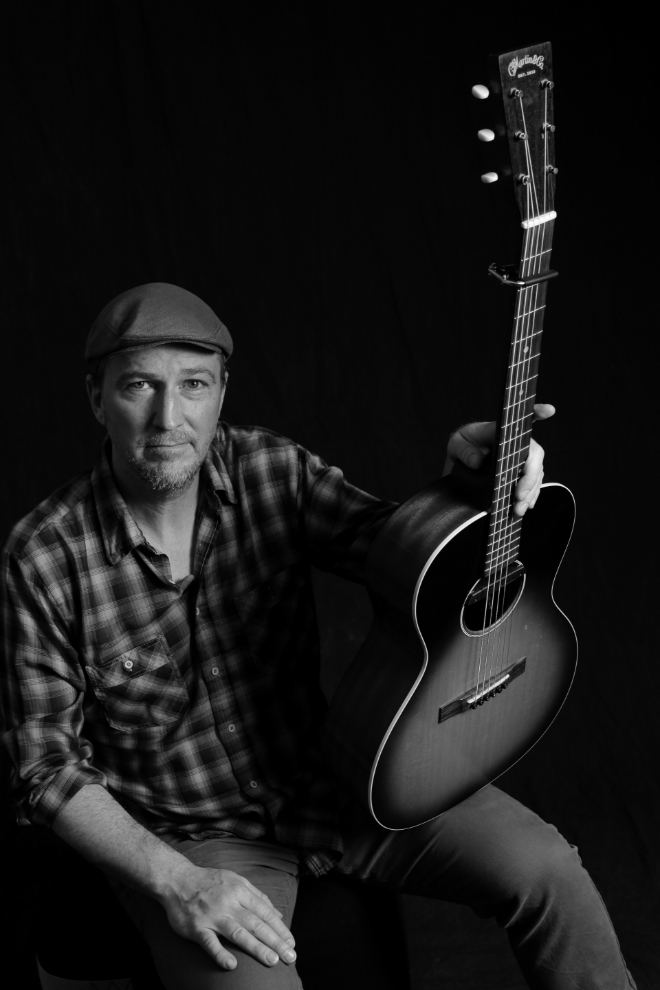 =
=



comment closed